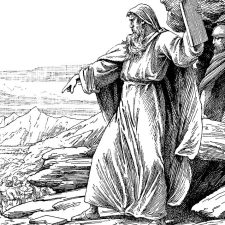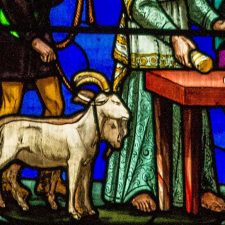As Scripture testifies in Matthew 2:2, the magi came from the east looking for the Messiah by saying, “Where is He who has been born King of the Jews? For we saw His star in the east and have come to worship Him.”. Although there is no consensus on who the magi were or where they came from, it is more likely they were Gentiles of high position from a country, perhaps Parthia, northeast of Babylon, who were given a special revelation by God of the birth of the King of the Jews. This occurred at a time when the prophecy of Daniel 9:25-27 was creating an expectation of Messiah’s imminent coming within Judaism and beyond (i.e., Herod). The idea that Messiah was to be a king and take charge of the existing government on behalf of the Jewish nation was a common understanding among the Jewish masses, and this paradigm became a theme of his entire public ministry.
Before Jesus was baptized onto the scene, John the Baptist was preaching, “Repent, for the kingdom of heaven is at hand” (Matthew 3:2). Jesus took up this same mantle in Matthew 4:17 as he began speaking to the masses and then extended it to His disciples’ charge in Matthew 10:7, “And as you go, preach, saying, ‘The kingdom of heaven is at hand’.” But what did this all mean? Was Messiah ready to demonstrate his physical authority or was there some other, more profound meaning of the kingdom of heaven? To answer this question, we need to look at His entire public ministry, particularly his response to the Jewish accusations against Him when brought to Pilate.
King of the Jews
When confronted with the accusation that He was the “King of the Jews” in John 18:33, Jesus first inquired of Pilate by questioning his own personal belief in the charges that somehow Jesus was a threat to the Roman authority of the Jewish nation. Jesus’s reply to Pilate was, “My kingdom is not of this world” (verse 36), thus redefining the kingdom as not a physical reality but a spiritual one. Jesus reiterates to Pilate that He is a king but that the defining element of His kingdom is “the truth” and that those who are of the truth hear the voice of their king (verse 37). Pilate understood that this was not Rome’s problem (“I find no guilt in Him,” verse 38) and intended to turn Jesus loose, but the Jewish leaders had something else in mind. This King needed to die!
This principle of the kingdom was further demonstrated to us through the interaction of the two thieves on the cross next to Jesus (see Luke 23:39-43). One of the thieves was only looking for a solution to his present situation, while the other comprehended the gravity of the moment. He understood that the two were being condemned for things they did while Jesus was innocent of His charges. This thief asked Jesus to remember him “when you come in Your kingdom”. Jesus’s response was to acknowledge that this thief would soon be in Paradise. The crux of the matter was that this thief recognized Jesus as a king since He was about to come to His kingdom. He was confirming that the truth of his statement, “this man has done nothing wrong,” allowed him to recognize the king and a kingdom. This criminal got saved!
In Your Midst
Jesus is asked about the kingdom of God by the Pharisees in Luke 17:20-21, and His response is enlightening. He tells them that the kingdom cannot be recognized by physical signs that are observable but that the kingdom is “in your midst.” The Greek word entos literally means inside, and the kingdom of God is a reality that exists inside each one who recognizes the king and is, therefore, of the truth. The Pharisees were never able to grasp this principle.
And the disciples came and said to Him, “Why do You speak to them in parables?” Jesus answered them, “To you it has been granted to know the mysteries of the kingdom of heaven, but to them, it has not been granted. “For whoever has, to him more shall be given, and he will have an abundance; but whoever does not have, even what he has shall be taken away from him. “Therefore, I speak to them in parables; because while seeing they do not see, and while hearing they do not hear, nor do they understand. (Matthew 13:10-13)
Once the Jewish leadership had accused Jesus of being demon possessed in Matthew 12:24, Jesus began teaching in parables. The disciples were confused that Jesus would begin speaking in parables instead of the normal teaching methods, and Jesus explained that the mysteries (secrets) of the kingdom are not understood within normal teaching methods but must be understood in the light of The Truth (see John 14:6). The Jewish leadership had rejected The Truth. By accusing Jesus of being of Beelzebul, Jewish leaders were saying that He could not be Messiah even though He had performed a number of miracles that only the Messiah could perform, including casting out the demon in the blind and mute man in Matthew 12:22-23. In verse 23, the people responded to this miracle by saying, “This man cannot be the Son of Man, can He.” [The Son of Man is a term used to reference Messiah].
Humility and Mercy
In Matthew 18:1-4, Jesus helps us to understand that success in the kingdom is tied to humility, and He uses a child to illustrate the point. When asked about “Who then is greatest in the kingdom,” He explained that becoming like children represents innocence and a lack of pride and haughtiness. Jesus was answering the question by concluding that selflessness, which produces humility, is the key. It defines greatness. Jesus also addressed greatness in the kingdom in the Sermon on the Mount. In Matthew 5:19, “Whoever then annuls one of the least of these commandments, and teaches others to do the same, shall be called least in the kingdom of heaven; but whoever keeps and teaches them, he shall be called great in the kingdom of heaven.” Since these commandments represent the very mind of God, to disregard them would be detrimental, while to honor and teach them would result in kingdom greatness.
In Paul’s first letter to Timothy, Paul was applying the principle of Hebrews 2:9 in his encouragement to Timothy by acknowledging the King eternal (1 Timothy 1:17), crowning Him with glory and honor. Recognizing that Paul’s giftedness and natural abilities did not get him anywhere in the Kingdom, rather, it was acknowledging that mercy opened the door for him to see the King and be a giant in the Kingdom! This instruction was consistent with what Jesus taught in Matthew 5:20 when He said, “For I say to you that unless your righteousness surpasses that of the scribes and Pharisees, you will not enter the kingdom of heaven.” Jesus was teaching that human effort to meet the religious demands of a Holy God does not work. It requires God’s perfect righteousness.
The Word of the Kingdom
In Jesus’s day, the Pharisees were dividing the Law of Moses into a hierarchy, with some being greater than others. Yet Jesus had quoted a Scripture from the Law of Moses (Deuteronomy 8:3) in Matthew 4:4 when He stated, “It is written, ‘MAN SHALL NOT LIVE ON BREAD ALONE, BUT ON EVERY WORD THAT PROCEEDS OUT OF THE MOUTH OF GOD.'” Jesus was teaching the importance of every Word, that all Scripture is necessary food.
In His public ministry, Jesus taught many parables that address the kingdom of heaven or the kingdom of God. In fact, eight of them appear in Matthew 13. He was teaching the dynamics of this kingdom which all of His disciples and followers need to understand. These principles allow us not only to grasp the conditions of entry but also how to function and thrive within the kingdom.
“Hear then the parable of the sower. When anyone hears the word of the kingdom and does not understand it, the evil one comes and snatches away what has been sown in his heart. This is the one on whom seed was sown beside the road. The one on whom seed was sown on the rocky places, this is the man who hears the word and immediately receives it with joy; yet he has no firm root in himself, but is only temporary, and when affliction or persecution arises because of the word, immediately he falls away. And the one on whom seed was sown among the thorns, this is the man who hears the word, and the worry of the world and the deceitfulness of wealth choke the word, and it becomes unfruitful. And the one on whom seed was sown on the good soil, this is the man who hears the word and understands it; who indeed bears fruit and brings forth, some a hundredfold, some sixty, and some thirty.” (Matthew 13:18-23)
Receiving the Word
The first of the eight parables from Matthew 13 is a direct reference to the Word of God, “the Word of the kingdom.” The King’s primary method of communication in the kingdom is the Word. Success in the kingdom is tied to hearing the Word and understanding it. The parable defines that the condition of the heart is the primary criterion that determines success. The seed sown beside the road has no room to establish its roots and therefore is easy pickings for the devil. This condition of the heart is determined by how the Word is received. In 1 Thessalonians 2:13, Paul says, “For this reason we also constantly thank God that when you received the word of God which you heard from us, you accepted it not as the word of men, but for what it really is, the word of God, which also performs its work in you who believe.” The Word has an intended work (see Isaiah 55:11), and it cannot do its work without having been received from God (the King) with the authority that accompanies it. According to Hebrews 4:2, the Word must be united by faith to accomplish what is intended.
The rocky places in the above parable speak of the one whose heart has not fully accepted the Word as truth, and therefore trials of life cause him to fall away. The thorns represent the cares of life that can interfere with the Word, and the Word, therefore, is unfruitful. The good soil is the environment where the Word produces great fruit because it is understood. The important point being made through this parable is that the environment of the heart, when the Word is spoken, determines the quality and volume of the fruit it will produce.
Serving Others
From the Mount of Olives (Matthew 25:31-36), Jesus taught the disciples about the coming judgment of all nations, promising that the blessed ones would inherit the kingdom. This kingdom was “prepared for you from the foundation of the world” and is given to those who have a ministry to the King through their relationship with those in need and their willingness to give of themselves to meet those needs. It was the plan of God from the very beginning that men would inherit the kingdom as a result of their willingness to serve the needs of others on behalf of the King.
In conclusion, the promise of Hebrews 12:28 is that each believer receives “a kingdom which cannot be shaken.” When he recognizes the kingdom by crowning the King (Jesus) with glory and honor (Hebrews 2:9) in his heart, he experiences kingdom life. As such, he should hold fast to the grace of God, the environment in which we have received that permanent kingdom, by showing gratitude to God in reverence and awe. Remember, Jesus died with a crown (of thorns) on His head.













